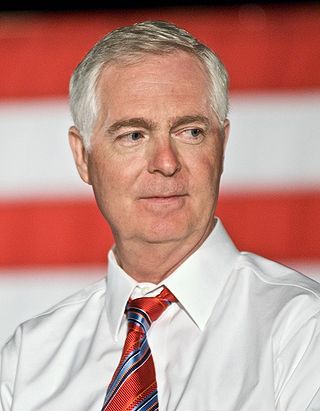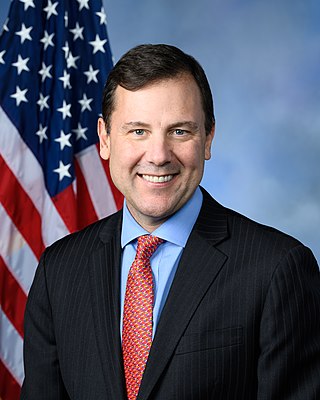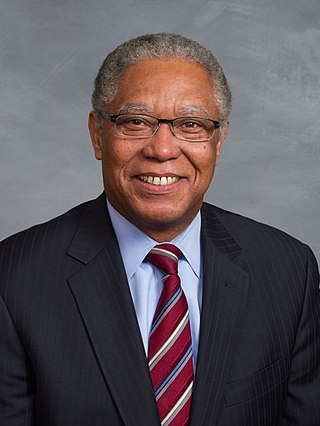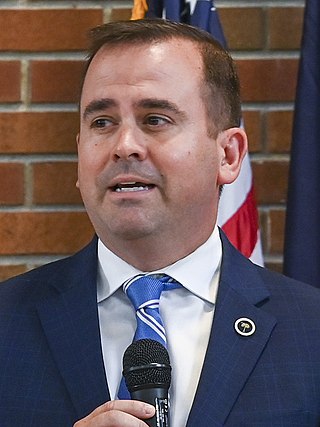
Richard A. Vinroot is an American politician and attorney from Charlotte, North Carolina. He served as the 52nd Mayor of Charlotte from 1991 to 1995. Vinroot ran unsuccessfully for Governor of North Carolina in 1996, 2000 and 2004. The City of Charlotte's Richard Vinroot International Achievement Award is named in his honor.

Michael Francis Easley is an American lawyer and politician who served as the 72nd governor of North Carolina from 2001 to 2009. He is the first governor of North Carolina to have been convicted of a felony. The conviction was later expunged by the Chief Judge of the Superior Court of Wake County. A member of the Democratic Party, Easley was North Carolina's second Catholic governor.

Fern H. Shubert is a former Republican member of the North Carolina General Assembly representing the state's thirty-fifth Senate district, including constituents in Mecklenburg and Union counties. An accountant from Marshville, North Carolina, Shubert served in the State House from 1994 to 1998 and again from 2000 to 2002. She served in the State Senate from 2002 to 2004, where she was the Republican whip.

The 2004 North Carolina gubernatorial election was held on November 2, 2004. The general election was between the Democratic incumbent Mike Easley and the Republican nominee Patrick J. Ballantine. Easley won by 56% to 43%, winning his second term as governor.

William Wilfred Cobey Jr. is an American politician. A member of the Republican Party, he served one term in the United States House of Representatives for North Carolina's 4th congressional district from 1985 to 1987.

Elections to choose members of the North Carolina Council of State were held on Tuesday, November 2, 2004. The U.S. Presidential election, U.S. House election, U.S. Senate election, the North Carolina General Assembly election, and North Carolina judicial elections were all held on the same day.

United States gubernatorial elections were held on November 2, 2004, in 11 states and two territories. There was no net gain in seats for either party, as Democrats picked up an open seat in Montana while defeating incumbent Craig Benson in New Hampshire, while Republicans defeated incumbent Joe Kernan in Indiana and won Missouri after Bob Holden lost in the primary. These elections coincided with the presidential election.

The 1968 United States Senate elections were elections for the United States Senate. Held on November 5, the 34 seats of Class 3 were contested in regular elections. They coincided with the presidential election of the same year. The Republicans picked up five net seats in the Senate. This saw Republicans win a Senate seat in Florida for the first time since Reconstruction.

The 1954 United States Senate elections was a midterm election in the first term of Dwight D. Eisenhower's presidency. The 32 Senate seats of Class 2 were contested in regular elections, and six special elections were held to fill vacancies. Eisenhower's Republican party lost a net of two seats to the Democratic opposition. This small change was just enough to give Democrats control of the chamber with the help of the Independent who at the start of this Congress in January 1955 agreed to caucus with them; he later officially joined the party in April 1955.

The 2006 New York gubernatorial election took place on November 7, 2006, to elect the governor and lieutenant governor of New York, concurrently with elections to the United States Senate in other states and elections to the United States House of Representatives and various state and local elections, then incumbent Republican governor George Pataki chose not to run for re-election in a fourth term. Democrat Eliot Spitzer, the New York Attorney General, won the election over former Republican state Assembly minority leader John Faso. As of 2024, this is the last time the Governor's office in New York changed partisan control. This was the first open-seat election since 1982. Primary elections were held on September 12. This is the last gubernatorial election where any of the following counties voted Democratic: Genesee, Chautauqua, Cattaraugus, Niagara, Fulton, Steuben, Tioga & Schoharie.

Thomas Howard Kean Jr. is an American politician serving as the U.S. representative from New Jersey's 7th congressional district since 2023. He represented New Jersey's 21st legislative district in the New Jersey Senate from 2003 to 2022, serving as minority leader from 2008 to 2022.

Daniel Terry Blue Jr. is an American politician and attorney serving as a member of the North Carolina Senate, representing the state's 14th Senate district, and is the Senate minority leader.

The North Carolina Democratic Party (NCDP) is the North Carolina affiliate of the Democratic Party. It is headquartered in the historic Goodwin House, located in Raleigh.

United States gubernatorial elections were held on November 7, 2000, in 11 states and two territories. The elections coincided with the presidential election. Democrats gained one seat by defeating an incumbent in West Virginia. As of 2024, this remains the last gubernatorial cycle in which a Democrat won in Indiana.

The 2000 North Carolina gubernatorial election was held on November 7, 2000. The general election was between the Republican nominee, former mayor of Charlotte Richard Vinroot and the Democratic nominee, state Attorney General Mike Easley. Easley won easily by 52% to 46%, and succeeded fellow Democrat Jim Hunt as governor.

Neal Collins is a Republican member of the South Carolina House of Representatives, representing the 5th district. He was first elected in 2014, and re-elected in every subsequent election. In 2010, he was one of several candidates running for the open seat of 3rd congressional district of South Carolina in the House of Representatives, which was held by J. Gresham Barrett, but left to compete in the 2010 Gubernatorial election for the Governor of South Carolina.

The 2016 United States Senate elections were held on November 8, 2016. The presidential election, House elections, 14 gubernatorial elections, and many state and local elections were held concurrently. In the elections, 34 of the 100 seats—all Class 3 Senate seats—were contested in regular elections; the winners served 6-year terms until January 3, 2023. Class 3 was last up for election in 2010 when Republicans won a net gain of 6 seats.

David Cheston Rouzer is an American politician who is the U.S. representative for North Carolina's 7th congressional district. Previously he was a Republican member of the North Carolina General Assembly, representing Johnston County and Wayne County in the 12th district of the North Carolina Senate.

Thomas Cowart Goolsby is a former Republican North Carolina State Senator representing New Hanover County.

United States gubernatorial elections were held on November 5, 2024, in 11 states and two territories. The previous gubernatorial elections for this group of states took place in 2020, except in New Hampshire and Vermont, where governors only serve two-year terms and elected their governors in 2022. In addition to state gubernatorial elections, the territories of American Samoa and Puerto Rico held elections for their governors. This was also the first time since 1988 that a Republican nominee won the gubernatorial election in American Samoa and also the first time since 1996 that an incumbent governor there lost re-election.


















